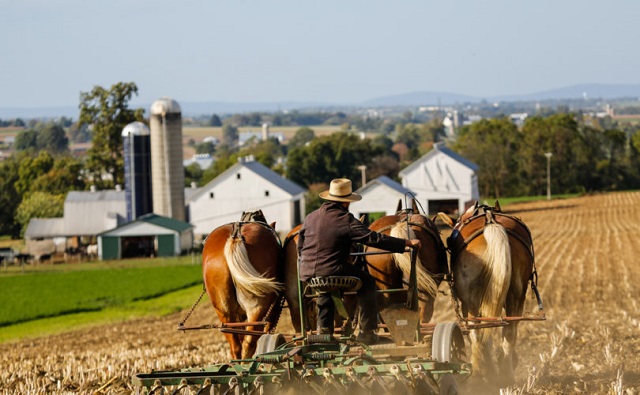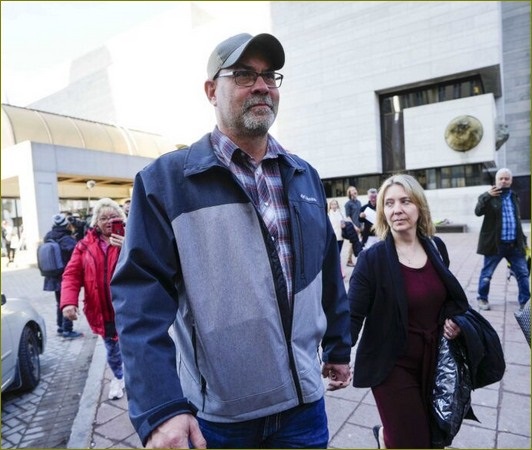COVID-19
Ontario Amish community facing over quarter million dollars in COVID fines

From LifeSiteNews
The Democracy Fund (TDF) announced that it would represent members of the Amish community in Grey County, Ontario, to fight fines incurred for failing to follow COVID regulations, including using the once-mandated, scandal-ridden ArriveCAN app.
A pro-freedom legal group is defending an Amish community against COVID fines for allegedly breaking travel regulations.
In a September 18 press release, The Democracy Fund (TDF) announced that it would represent members of the Amish community in Grey County, Ontario, to fight fines incurred for failing to follow COVID regulations, including using the once-mandated, scandal-ridden ArriveCAN app.
“These are people who, due to their faith, do not use modern technology,” TDF senior litigation counsel Adam Blake-Gallipeau declared. “They travel by horse and buggy and are unfamiliar with operating a telephone, let alone an app on a present-day cell phone.”
TDF is defending seventy-four community members who were fined nearly $300,000 for failing to complete the ArriveCAN app, among other violations. During the COVID “pandemic,” the Trudeau government mandated that everyone leaving or entering Canada use the ArriveCAN app, which monitored and collected information from Canadians.
Since Amish communities do not use modern technology, they likewise did not use the ArriveCAN app. Additionally, TDF noted that many of the individuals were not properly notified about the tickets or trial dates and therefore did not attend their trials.
As a result, judges made convictions in their absence. The rulings included placing liens on their properties, “posing a severe threat to their community and livelihoods should the government force the sale of their lands.”
Amish communities survive almost solely off their land, through farming, gardening, and harvesting wood. The loss of their land would mean losing both their home and livelihood.
Therefore, TDF plans to file applications to reopen these convictions and hopefully to challenge the fines in court.
“We anticipate that this legal process may be lengthy, but with your support, TDF is committed to addressing and correcting this pandemic-related injustice,” TDF declared.
TDF’s announcement comes after the legal group offered free legal help for anyone with outstanding COVID-related fines.
Over the last couple of years, TDF has been active in helping Canadians persecuted under COVID mandates and rules fight back. Notable people it has helped include Dr. Kulvinder Kaur Gill, an Ontario pediatrician who has been embroiled in a legal battle with the College of Physicians and Surgeons of Ontario (CPSO) for her anti-COVID views. She has also had the help of Elon Musk.
It is worth noting that while the Amish may be using their religious beliefs as a defense against their refusal to use the ArriveCAN app, other legal experts have objected to the once-mandatory application on the grounds that it infringed on Canadians’ mobility rights and other rights to privacy.
COVID-19
Chris Barber asks Court to stay proceedings against him

Chris Barber leaves the courthouse in Ottawa after the verdict was delivered in his trial with fellow Freedom Convoy organizer Tamara Lich, on Thursday, April 3, 2025. (Photo credit: THE CANADIAN PRESS/Justin Tang)
“Chris Barber consistently followed the legal advice that he received from police officers, lawyers, and a Superior Court judge.”
The Justice Centre for Constitutional Freedoms announces that Chris Barber has asked the Ontario Court of Justice for a stay of proceedings against him. He argues that the legal advice given to him by police officers, lawyers, and a Superior Court judge during the Freedom Convoy was erroneous and that, as a result, the Crown is not entitled to convict him.
On April 3, 2025, Justice Heather Perkins-McVey of the Ontario Court of Justice found Mr. Barber guilty of mischief and of counselling others to breach a court order. That decision followed upon a lengthy 45-day trial stretching from September 2023 to September 2024.
Diane Magas, Chris Barber’s lawyer, filed a Stay of Proceedings Application with the Court on April 16, 2025. In that Application, Mr. Barber and his legal team argue that he did, in fact, seek legal advice regarding his actions during the Freedom Convoy protest.
For example, he followed Ottawa Police Services directions on where to park trucks in downtown Ottawa. When an officer asked him to move his truck, “Big Red,” from downtown Ottawa, he moved it. On February 7 and 16, 2022, his lawyer at the time advised him that Justice Maclean of the Superior Court had confirmed that the protest could continue so long as it continued to be peaceful and safe.
In essence, Chris Barber and his legal team are now arguing that he followed all legal advice that was given to him in 2022, but that some of the legal advice he was given turned out to be erroneous.
His Application argues for a stay of proceedings against him on the grounds that “he sought advice from lawyers, police officers, and a Superior Court Judge on the legality of the protest he was involved in.”
This Application was filed one day after Chris Barber was informed that the Crown was pursuing a two-year prison sentence against him. In an April 15 Facebook post, Mr. Barber wrote, “My family got bad news today. The Crown prosecutor wants to lock Tamara Lich and me in prison for two years-for standing up for freedom. They also want to [seize] my truck, Big Red, and crush her like she’s just scrap metal or sell it at auction.”
If the Application is successful, Mr. Barber would not see prison time, nor would his truck be seized.
“Throughout the peaceful Freedom Convoy, Chris Barber did what any law-abiding Canadian would do: seeking out and acting upon the best legal advice available to him,” stated John Carpay, President of the Justice Centre. “Chris Barber consistently followed the legal advice that he received from police officers, lawyers, and a Superior Court judge.”
“To hold a well-meaning man behind bars for two years and to confiscate his property, as is now demanded by the Crown, would bring the administration of justice into disrepute,” Mr. Carpay continued. “Crown prosecutors are painting a portrait of a dangerous criminal, even while Chris Barber sought out and followed legal advice when participating in the Freedom Convoy in Ottawa in 2022. Chris worked within the law when peacefully exercising his Charter freedoms of expression, assembly and association.”
COVID-19
Tamara Lich and Chris Barber trial update: The Longest Mischief Trial of All Time continues..

Here are the last two posts on Tamara Lich’s Substack posted April 16 and April 17:
April 17:
We weren’t able to secure a date yesterday for the sentencing hearing and instead another ‘speak to’ was set for April 28. In addition to time needed to enter numerous impact statements (coincidentally and conveniently comprised of individuals suing us for $300,000,000.00), the Crown has added a forfeiture order to seize Big Red which will add significant time to argue. Therefore I suspect all parties will need to find 4-5 days in their schedules for the sentencing hearing.
The Crown is also seeking two years in federal prison for each of us.
Three days were tentatively set aside at the end of May for a Stay of Proceedings application put forth yesterday by Ms. Magus on Chris’ behalf.
And so The Longest Mischief Trial of All Time continues to plod along, still no end in sight.
April 16:
In our trial, the longest mischief trial of all time, we set hearing dates to set hearing dates.
There will be a ‘speak to’ this afternoon to set a date for the sentencing hearing which we think will take 3-4 days. Following that hearing, Chris and I will return to Ottawa again for the actual sentence.
The Crown is seeking 2 years in a federal penitentiary for both of us, plus they have decided to file an application to confiscate Big Red. Funny, there hasn’t been a single other convoy case in which the Crown demanded that persons property or vehicle, yet they seem to want Big Red. You need to ask yourself why.
Chris raised his children in that truck, changed their diapers in that truck, had his old dog, Buddy, put to sleep in the passenger seat when his time came because that was Buddy’s favourite place in the world.
This is not about the rule of law.
It’s about crushing a Canadian symbol of Hope, Pride & Unity
-

 Autism2 days ago
Autism2 days agoRFK Jr. Exposes a Chilling New Autism Reality
-

 COVID-192 days ago
COVID-192 days agoCanadian student denied religious exemption for COVID jab takes tech school to court
-

 2025 Federal Election2 days ago
2025 Federal Election2 days agoNeil Young + Carney / Freedom Bros
-

 International2 days ago
International2 days agoUK Supreme Court rules ‘woman’ means biological female
-

 2025 Federal Election1 day ago
2025 Federal Election1 day agoTucker Carlson Interviews Maxime Bernier: Trump’s Tariffs, Mass Immigration, and the Oncoming Canadian Revolution
-

 Business1 day ago
Business1 day agoChina, Mexico, Canada Flagged in $1.4 Billion Fentanyl Trade by U.S. Financial Watchdog
-

 Health2 days ago
Health2 days agoWHO member states agree on draft of ‘pandemic treaty’ that could be adopted in May
-

 espionage1 day ago
espionage1 day agoEx-NYPD Cop Jailed in Beijing’s Transnational Repatriation Plot, Canada Remains Soft Target





